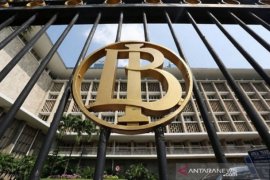"Based on our calculations, the total of our foreign exchange reserves is more than sufficient. Not only it is above US$100 billion or more than sufficient to meet the need of imports, debt payment as well as possible reversal but also because based on our predictions it is enough for withstanding pressures," Bank Indonesia`s director of economic research and monetary policy Perry Warjiyo said here on Monday.
The rupiah exchange rate has continuously dropped against the US dollar since last week from Rp8,550 to Rp8,805 on Monday.
He said with the reserves reaching US$122 billion last week Bank Indonesia is ready to intervene by selling US dollars to the market and use the proceeds for buying state bonds in the secondary market.
"We will maintain the movement of the rupiah exchange rate would not become too fluctuative in line with conditions in the countries in the region and under such conditions it is normal for BI to intervene," he said.
He said Bank Indonesia would maintain the rupiah volatility in line with the development of foreign currencies in the countries in the region while considering the achievement of the monetary targets set by BI before.
He said the weakening of the rupiah has been caused by economic crisis in Europe which has so far found no way-out yet so that foreign investors who are worried about the situation have withdrawn their investments in a number of countries including Indonesia.
"There have been pressures on the rupiah and other currencies in the money market and this will continue until a resolution is found of the European crisis," he said.
Bank Indonesia deputy governor Hartadi A Sarwono earlier said the rupiah exchange rate would strengthen again after the pressures subsided following various BI policies.
Various intervention that BI has done has been able to increase investors` confidence so that pressures on the rupiah have dropped and the trend of its appreciation would happen soon.
He said fluctuations in the financial market last week were triggered by worries over the worse handling of the crisis in Europe pressuring short-term foreign investors out on profit taking.
Strategic investors however remained because Indonesian prospects are bright, he said.
"We even saw new strategic investors coming to the Indonesian financial market," he said.
He said the foreign exchange reserves dropped last week due to market operations to stabilize the rupiah and pay government foreign debt.
"The foreign exchange reserves were down more than US$2 billion from US$124.6 billion to around US$122 billion," he said. (*)
Editor: Aditia Maruli Radja
Copyright © ANTARA 2011









